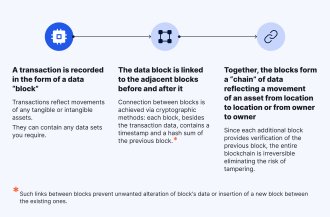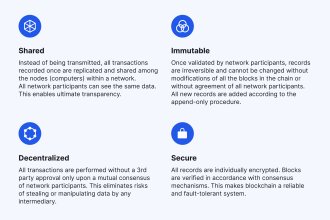
Contact us
Our team would love to hear from you.

Blockchain has great application potential across industries from healthcare to aviation due to its ability to perfectly organize and securely store data, bring transparency to transactions, and eliminate intermediaries. The technology is also getting widely adopted in retail, offering a way to establish trust and enable transparency among manufacturers, retailers, and consumers. In this article, we will take a closer look at what stands behind the technology and how to put it to good use in the retail industry.
Growing consumers’ expectations of service force retailers to apply new approaches in order to stay more agile and competitive on the market and provide better customer experience. Blockchain stands out among innovative technologies offering immense value to the retail industry. All along the way from a manufacturer to the shelves in a store, it can provide greater transparency into the retail supply chain, reduce costs and risks, build confidence among retailers resulting in increased consumer trust and business outcomes overall.
According to Gartner, by 2025 20% of the top food retailers by revenue will use blockchain for food traceability to add transparency to production and ensure better quality of goods. The added value of blockchain deployment in the supply chain is estimated to reach up to $176 billion by 2025 and exceed $3.1 trillion by 2030.
The global audit provider Deloitte underlines in its report that blockchain technology can address four major supply chain pain points in the retail and consumer goods market: traceability, compliance, stakeholder relationship management, and flexibility.
Blockchain is a digital database which records data or transactions that can be simultaneously used or shared within a unified and decentralized network. A key difference between blockchain and regular database technology lies in the way the data is stored.


Therefore, the technology allows recording and transmitting information in a consistent, immutable and transparent way with access limited to the network members.
The database is:


The value of blockchain in retail extends to various parts of the business. Here we will look at the benefits of blockchain in the retail industry.
Blockchain presents a strong case for improving and optimizing supply chain management. It can transform the supply chain in many ways:

The solution allows auto retailers to smoothly integrate online shopping capabilities into their web pages to considerably improve customer experience.
Blockchain can facilitate business operations by reducing or eliminating potential friction between business partners. Smart contracts can be used to simplify the implementation of contracts. The terms of a contract can be automatically executed, once the predefined contractual obligations are met (e.g. once the shipment and receipt of the goods is verified, the system will automatically transfer the funds to the supplier).
In addition, businesses can create private blockchain networks where the blockchain technology provides retailers and supply chain participants with quick access to reliable data via a transparent, shareable and immutable database where all stakeholders can promptly get all required information without security breach.
When executing trades, blockchain in retail helps to avoid errors that can arise while keeping records via receipts and invoices. Due to the use of the distributed database, the information on transactions is consistent and transparent to both parties and is almost impossible to alter or falsify.
Carrefour has become a blockchain pioneer that integrated the technology into its organic product and textile lines. The initiative is aimed at meeting the consumer’s growing demand for transparency in terms of goods’ provenance and methods of their production. The product is tracked throughout the whole supply chain and ultimately to the end user. As a result, every product ready for sale has a scannable QR code that provides the consumer with information on the lifecycle of the product, including details about the harvest, certificates, flow path, and more.
The retail giant provides a reliable and efficient environment for customers by using the tool in advertising and marketing.
In addition, Amazon provides their own blockchain based system that uses Hyperledger Fabric and Ethereum. The system enables businesses to create and manage scalable and tailored blockchain networks using different blockchain frameworks.
Alibaba is likewise no stranger to Blockchain. It uses a Blockchain as a Service (BaaS) infrastructure to enhance its product traceability system. The blockchain technology in retail allows recording product registration, logistic details, and customs clearance. It is a good counterfeiting solution that provides more transparency of information.
The diamond giant has created the world’s first blockchain-powered diamond platform Tracr. The technology allows tracing the diamond journey from its extraction to reaching the storefront. It provides an immutable record of the diamonds’ origin bringing jewelry retailers confidence in the provenance of their purchase and fostering their clients’ trust in ethics and reliability of the product.
Known for its success in supply chain management, Walmart couldn’t escape the major issue facing the transportation industry: great data inconsistencies in freight invoice and payment process resulting in long payment delays and costly reconciliation efforts. The company has adopted an automated blockchain-based freight and payment network. Apart from automating invoice and payments processes among Walmart’s 70-plus third-party freight carriers, the system helps track deliveries, verify transactions, and increase operational efficiencies. It is undoubtedly a quick solution to payment disputes.
With such a comprehensive application scope of blockchain in the retail industry, both end users and retailers can reap the advantages of the technology. Its ability to provide better product traceability and authentication as well as transaction visibility and immutability enables cost-effectiveness and transparency in the entire value chain. This means lower prices and safer products for consumers and their increased trust in retailers in the long run.
In order to make your solution successful, you will need an experienced team that can uniquely meet your needs and provide the highest level of efficiency and security. Being a reliable blockchain software development company, EffectiveSoft knows how to leverage the benefits of the technology not only in retail, but also in other industries. Our blockchain development experience has been evaluated by Clutch. We hit the rating of top blockchain companies.

Blockchain offers transformative benefits for the retail industry by enhancing transparency, security, and operational efficiency. One of its most significant advantages is improved supply chain transparency. By leveraging blockchain, retailers can trace a product’s journey from its source to the store shelf. Additionally, blockchain streamlines operations and reduces costs through automation. Smart contracts enable faster, error-free transactions by automating payment processes and supply chain agreements. Retailers can also implement blockchain-based loyalty programs, simplifying point accumulation and redemption while ensuring security. Furthermore, blockchain reduces fraud and improves inventory management by providing real-time, accurate data.
One primary concern is safeguarding private keys, which are essential for accessing blockchain accounts and signing transactions. Losing or compromising private keys can result in irrecoverable losses. Another major challenge lies in preventing vulnerabilities in smart contracts, as poorly written or untested code can be exploited by malicious actors, leading to significant financial and reputational damage. Also, blockchain networks face potential threats like 51% attacks, where a malicious entity gains majority control of the network, enabling double-spending or transaction reversals. Retailers using public blockchains must also address concerns about transaction privacy, as blockchain data is often transparent and accessible. Developers need to implement encryption and privacy-preserving technologies, such as zero-knowledge proofs, to protect sensitive information like customer data and transaction details.
The development costs of blockchain projects in retail vary widely depending on the scope and complexity of the solution. While the upfront investment can be high, the long-term benefits of automation, fraud reduction, and operational efficiency often outweigh these costs. Contact our team to estimate your project.
The timeline for developing and deploying a blockchain solution in retail depends on the project’s complexity and requirements. For a straightforward application, such as a basic supply chain tracking system or a loyalty program, the development phase might take 3–6 months. For more complex solutions, such as multi-party consortium blockchains, cross-border payment systems, or advanced inventory management tools, the timeline can extend to 12 months or more. Proper planning and resource allocation are critical to meeting timelines while ensuring the success of the blockchain implementation.
Can’t find the answer you are looking for?
Contact us and we will get in touch with you shortly.
Our team would love to hear from you.
Fill out the form, and we’ve got you covered.
What happens next?
San Diego, California
4445 Eastgate Mall, Suite 200
92121, 1-800-288-9659
San Francisco, California
50 California St #1500
94111, 1-800-288-9659
Pittsburgh, Pennsylvania
One Oxford Centre, 500 Grant St Suite 2900
15219, 1-800-288-9659
Durham, North Carolina
RTP Meridian, 2530 Meridian Pkwy Suite 300
27713, 1-800-288-9659
San Jose, Costa Rica
C. 118B, Trejos Montealegre
10203, 1-800-288-9659